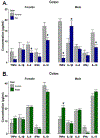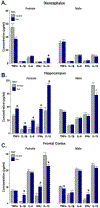Ten-week high fat and high sugar diets in mice alter gut-brain axis cytokines in a sex-dependent manner
- PMID: 34748922
- PMCID: PMC8761169
- DOI: 10.1016/j.jnutbio.2021.108903
Ten-week high fat and high sugar diets in mice alter gut-brain axis cytokines in a sex-dependent manner
Abstract
Diets high in fat and sugar induce inflammation throughout the body, particularly along the gut-brain axis; however, the way these changes in immune signaling mediate one another remains unknown. We investigated cytokine changes in the brain and colon following prolonged high fat or sugar diet in female and male adult C57BL/6 mice. Ten weeks of high fat diet increased levels of TNFα, IL-1β, IL-6, IFNγ, and IL-10 in the female hippocampus and altered cytokines in the frontal cortex of both sexes. High sugar diet increased hippocampal cytokines and decreased cytokines in the diencephalon and frontal cortex. In the colon, high fat diet changed cytokine expression in both sexes, while high sugar diet only increased TNFα in males. Causal mediation analysis confirmed that colon IL-10 and IL-6 mediate high fat diet-induced neuroimmune changes in the female hippocampus and male frontal cortex. Additionally, high fat diet increased food consumption and weight gain in both sexes, while high sugar diet decreased male weight gain. These findings reveal a novel causal link between gut and brain inflammation specific to prolonged consumption of high fat, not high sugar, diet. Importantly, this work includes females which have been under-represented in diet research, and demonstrates that diet-induced neuroinflammation varies by brain region between sexes. Furthermore, our data suggest female brains are more vulnerable than males to inflammatory changes following excessive fat and sugar consumption, which may help explain the increased risk of inflammation-associated psychiatric conditions in women who eat a Western Diet rich in both dietary components.
Keywords: colon cytokines; food consumption; gut-brain axis; high fat diet; high sugar diet; neuroinflammation.
Copyright © 2021 Elsevier Inc. All rights reserved.
Figures







References
-
- Bortolin RC, Vargas AR, Gasparotto J, Chaves PR, Schnorr CE, Martinello KB, et al. A new animal diet based on human Western diet is a robust diet-induced obesity model: comparison to high-fat and cafeteria diets in term of metabolic and gut microbiota disruption. Int J Obes (Lond) 2018;42:525–534. - PubMed
-
- De Souza CT, Araujo EP, Bordin S, Ashimine R, Zollner RL, Boschero AC, Saad MJA, Velloso LA. Consumption of a fat-rich diet activates a proinflammatory response and induces insulin resistance in the hypothalamus. Endocrinology 2005;146:4192–4199. - PubMed
Publication types
MeSH terms
Substances
Grants and funding
LinkOut - more resources
Full Text Sources

